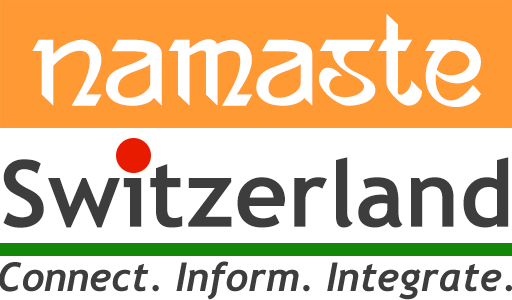“Behind every high-performance formula is an act of kindness towards the planet. My vision was to have an intelligent brand that speaks about looking after yourself, but also for others.”
Appenzell-based Anju Rupal is the founder of Abhati Suisse, a cosmetic brand known as a ‘beauty rebel with a cause’. Shinta Simon brings you the story of how Anju successfully built a purpose-driven cosmetics company that blends together Swiss technology and Indian tradition.
The word ‘Abhati’ means ‘to shine through’ in Sanskrit, and is an apt moniker for a brand that has become known for aesthetic activism.
Social worker-turned entrepreneur Anju Rupal and the company she founded, Abhati Suisse, embody the values of a ‘beauty rebel with a purpose’ – their philosophy of giving back to the world and the people is at the core of everything they do. “The most valid term for Abhati is that it is a future-forward beauty brand. When you step in your bath or shower and you are not only making a difference to yourself but also a difference to a community.”, says Anju.

Founded in 2015, Abhati Suisse is a luxury hair and skincare brand that donates a percentage of profits towards ‘1% for the planet’ where these funds go to organizations like WeForest. It also makes efforts towards educating girl children in India through their partnership with the foundation Educate Girls. “I have realised that education is the only sustainable way for these girls to be lifted out of poverty. There is a huge shift that happens through education.”, says Anju.
The company is one of the few in Switzerland to be recognized by the B Corp – a status awarded to companies that meet the highest standards of verified social and environmental performance, accountability and transparency – a balance of profit with purpose.
Today, products from the Abhati Suisse brand are available at major retailers from Sephora in India to Credo in the US. It is endorsed by the makeup artists of the likes of Meghan Markle and Aishwarya Rai. Its unique blend of Indian tradition, Swiss technology and high-end product design has led to a range of luxury products with intriguing names such as ‘Kangi’ and ‘Kaveri’. More remarkably, the brand has sent more than 392,000 girls to school and continues to work towards social causes.
The genesis
 British-born Anju Rupal was raised by Punjabi parents in Essex, London. Time-honoured natural beauty rituals such as using besan and turmeric in face packs were a way of life. So was resourcefulness, by way of recycling and reusing everyday items – from newspapers and yoghurt containers to package food. These practices would eventually find their way into the philosophy behind the company Anju went on to build.
British-born Anju Rupal was raised by Punjabi parents in Essex, London. Time-honoured natural beauty rituals such as using besan and turmeric in face packs were a way of life. So was resourcefulness, by way of recycling and reusing everyday items – from newspapers and yoghurt containers to package food. These practices would eventually find their way into the philosophy behind the company Anju went on to build.
She studied sociology and ethnology, worked as a social worker in England where she was instrumental in setting up a shelter for victims of domestic violence and was actively engaged in policy work. Her Punjabi came in handy here, on occasions when domestic victims spoke the language and needed a translator. A visit to India in the 90s, also left a profound impact on her, as she realised how sanitation and education were not easily accessible to women.
After moving to Switzerland and marrying her Swiss husband, she continued to be involved in social projects, managing the women’s shelter in St Gallen and raising capital for it. She also co-founded the children’s emergency clinic Swiss Medi Kids.
Living in Appenzell in the early 2000s as a working mother of two young girls, Anju recalls how she overcame the lack of suitable childcare options by teaming up with a friend and starting a creche, thus enabling herself to get to work. “I am someone who just gets up and gets it done”, she says, matter-of-factly.
The power of mobilization
Anju realised that she had a knack for entrepreneurship and the right skill set for launching a business. She was also committed to applying her years of experience as a social worker, for the benefit of the people and the planet. The result was the foundation of Abhati Suisse, a brand with a conscience.
“I knew I wanted to do something business-wise that was impact-driven. I didn’t want to just set up another beauty brand”, says Anju.
In 2004, Anju co-founded Neo Institute (which later was renamed WeForest), which supports sustainable farming practices and reforestation projects. During the course of her work with the foundation, she met some inspiring farmers and was introduced to botanicals and indigenous ingredients in the Himalayan region. These farmers were growing ingredients with therapeutic properties, yet were unable to make a livelihood out of them.
“Serendipity had it that I met some people in the beauty industry and I realised that the logical thing to do would be to tie in the work done by the farmers, in order to make an impact”, she says.
Anju was able to mobilise her connections within the beauty industry, ranging from cosmetics formulators, perfumers and the design studio Paperlux who were happy to come in and work pro-bono.
Challenges, and the way forward
Anju highlights some of the challenges and complexities of working with farmers while delivering high-quality ingredients that the cosmetic formulations demand. Luxury products are made with scientifically-proven ingredients and have to meet certain standards. The practice of cash cropping and the use of pesticides led to the depletion of soil nutrients.
The way forward was in training the farmers in sustainable farming practices. For example, the wild turmeric that is used in the product formulations is grown in crop rotation with organic cotton that the farmers grow for sustainable fashion brands.
The company takes its time to research and innovate before product launches. From understanding different hair and skin types to quality formulations, it can take up to 2-3 years to launch a product.

Covid-19 threw up a whole new set of challenges, particularly supply chain-related ones. The Swiss-based team took this time to tinker around in their lab, and the result was a solid shampoo bar. “Did you know that shampoo originates in India?”, Anju asks during our interview. The solid shampoo is a hark back to the origins of shampoo, in the form of a bar in sustainable packaging.
So, what’s next in store for the company? There is much to look forward to this year. A brand partnership with a hotel, to develop a luxury line of products, ties in with their goal of furthering brand visibility. The upcoming launch of compostable products, and growing their partnership with Sephora.
“I don’t know of many Swiss brands that have come out like we have, and addressed all the areas – sustainability and impact AND done it in a way that’s so design forward”, says Anju.

Anju’s message to our readers
To entrepreneurs everywhere, and to women-owned businesses, in particular, Anju has this to say: “It is very important to connect to people. Go to events and mingle, listen and ask – it’s important to ask if you need something. I wouldn’t be where I am today if I didn’t ask people to help and support me in my journey.”
She emphasises the importance of being transparent about where you are and what you need. For those based in Switzerland, she also recommends the Ladies Drive, a network of women who support each other. For growing conversations and networking, she also recommends LinkedIn.
Disclaimer: Written in good faith, we do not undertake any financial/reputational impact or other obligations/liabilities that may arise from the content.












